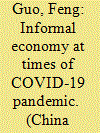| Srl | Item |
| 1 |
ID:
099911


|
|
|
|
|
| Publication |
2010.
|
| Summary/Abstract |
This paper investigates the link between hot money and business cycle volatility in China from January 1997 to December 2009. Using the structural vector error correction model, we find a considerable degree of long-run cointegration and bidirectional causality effects between hot money and business cycle volatility. The speculative shocks are found to temporarily promote China's economic growth, but also to exacerbate business cycle volatility. The liquidity shock stemming from hot money is shown to be the primary factor responsible for the significantly enhanced fluctuation in business cycles during the most recent global financial crisis period. This could be detrimental to the smooth operation of financial markets. Therefore, in forming future policies, it is critical for policy-makers to take precautions against the speculative factors.
|
|
|
|
|
|
|
|
|
|
|
|
|
|
|
|
| 2 |
ID:
088491


|
|
|
|
|
| Publication |
2009.
|
| Summary/Abstract |
The paper investigates the relationship between changes in asset wealth and the trend movements of household consumption in urban China. Using the vector error correction cointegration model, we demonstrate that there is a unique long-run cointegrating relationship between household consumption, disposable income, financial wealth and housing wealth in urban China. We find that housing wealth is the only factor that restores the long-run equilibrium relationship when the cointegrated system is disturbed by an external shock. In addition, our permanent-transitory variance decomposition analysis indicates that nearly all variance in the movement of consumption is permanent, supporting the classical random walk hypothesis of consumption behavior. However, a large proportion of variance in the short-run movements of housing wealth is found to be transitory.
|
|
|
|
|
|
|
|
|
|
|
|
|
|
|
|
| 3 |
ID:
187819


|
|
|
|
|
| Summary/Abstract |
We provide a first view of vulnerable informal economy after the blows from COVID-19, using transaction-level business data of around 80 million offline micro businesses (OMBs) owners from the largest Fintech company in China and employing machine learning method for causal inference. We find that the OMBs activities in China experienced an immediate and dramatic drop of 50% during the trough. The businesses had rebounded to around 80% of where they should be seven weeks after the COVID-19 outbreak, but had remained at this level until the end of our time window. We find a larger disruption to the OMBs in urban areas, the female merchants and the merchants who were not grown up in the places where they conducted businesses. We discuss the implications for policy support to the most vulnerable, and highlight the importance to take full advantage of digital development to follow up the informal economy.
|
|
|
|
|
|
|
|
|
|
|
|
|
|
|
|